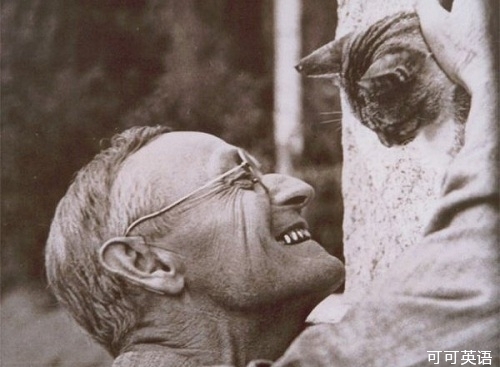(单词翻译:单击)
名著阅读
"Surely," Siddhartha laughed, "surely I have travelled for my amusement. For what else? I have gotten to know people and places, I have received kindness and trust, I have found friendship. Look, my dear, if I had been Kamaswami, I would have travelled back, being annoyed and in a hurry, as soon as I had seen that my purchase had been rendered impossible, and time and money would indeed have been lost. But like this, I've had a few good days, I've learned, had joy, I've neither harmed myself nor others by annoyance and hastiness. And if I'll ever return there again, perhaps to buy an upcoming harvest, or for whatever purpose it might be, friendly people will receive me in a friendly and happy manner, and I will praise myself for not showing any hurry and displeasure at that time. So, leave it as it is, my friend, and don't harm yourself by scolding! If the day will come, when you will see: this Siddhartha is harming me, then speak a word and Siddhartha will go on his own path. But until then, let's be satisfied with one another."
Futile were also the merchant's attempts, to convince Siddhartha that he should eat his bread. Siddhartha ate his own bread, or rather they both ate other people's bread, all people's bread. Siddhartha never listened to Kamaswami's worries and Kamaswami had many worries. Whether there was a business-deal going on which was in danger of failing, or whether a shipment of merchandise seemed to have been lost, or a debtor seemed to be unable to pay, Kamaswami could never convince his partner that it would be useful to utter a few words of worry or anger, to have wrinkles on the forehead, to sleep badly. When, one day, Kamaswami held against him that he had learned everything he knew from him, he replied: "Would you please not kid me with such jokes! What I've learned from you is how much a basket of fish costs and how much interests may be charged on loaned money. These are your areas of expertise. I haven't learned to think from you, my dear Kamaswami, you ought to be the one seeking to learn from me."
Indeed his soul was not with the trade. The business was good enough to provide him with the money for Kamala, and it earned him much more than he needed. Besides from this, Siddhartha's interest and curiosity was only concerned with the people, whose businesses, crafts, worries, pleasures, and acts of foolishness used to be as alien and distant to him as the moon. However easily he succeeded in talking to all of them, in living with all of them, in learning from all of them, he was still aware that there was something which separated him from them and this separating factor was him being a Samana. He saw mankind going trough life in a childlike or animallike manner, which he loved and also despised at the same time. He saw them toiling, saw them suffering, and becoming gray for the sake of things which seemed to him to entirely unworthy of this price, for money, for little pleasures, for being slightly honoured, he saw them scolding and insulting each other, he saw them complaining about pain at which a Samana would only smile, and suffering because of deprivations which a Samana would not feel.
He was open to everything, these people brought his way. Welcome was the merchant who offered him linen for sale, welcome was the debtor who sought another loan, welcome was the beggar who told him for one hour the story of his poverty and who was not half as poor as any given Samana. He did not treat the rich foreign merchant any different than the servant who shaved him and the street-vendor whom he let cheat him out of some small change when buying bananas. When Kamaswami came to him, to complain about his worries or to reproach him concerning his business, he listened curiously and happily, was puzzled by him, tried to understand him, consented that he was a little bit right, only as much as he considered indispensable, and turned away from him, towards the next person who would ask for him. And there were many who came to him, many to do business with him, many to cheat him, many to draw some secret out of him, many to appeal to his sympathy, many to get his advice. He gave advice, he pitied, he made gifts, he let them cheat him a bit, and this entire game and the passion with which all people played this game occupied his thoughts just as much as the gods and Brahmans used to occupy them.
"当然,"席特哈尔塔微笑道,"我这次去当然是为了消遣。不然是为了什么?我熟悉了许多人和地方,我享受了友好和信任,我赢得了友谊。瞧,亲爱的,假如我是卡马斯瓦密,看到我的生意已经落空,就会十分气恼地匆匆赶回,而时间和金钱实际上已经损失了。可是,我却度过了美好的几天,学到了东西,享受了快乐,没有因烦恼和匆忙而伤害自己与别人。如果我以后再去那儿,也许去采购以后的收成,或者是为了别的目的,那么,友好的人们就会热情友好地接待我,我也会庆幸自己当时并没有流露出匆忙与烦恼。好吧,将就点儿吧,朋友,别因为训斥我而伤了你自己!假如有那么一天你看到,这个席特哈尔塔给你造成了损失,那么你只需说一句话,席特哈尔塔就会走人!不过,在那之前,咱们还是互相将就点儿吧。"
卡马斯瓦密企图让席特哈尔塔想念他吃的是卡马斯瓦密的砚,结果是白费力气。席特哈尔塔吃的是他自己的面包,或者更确切地说,他们俩都是吃别人的砚,吃大家的砚。席特哈尔塔根本就听不进卡马斯瓦密的忧虑,而卡马斯瓦密却总是忧心忡忡。如果一桩生意有可能失败,如果一批货物运丢了,如果一个欠债人还不了债,那么,卡马斯瓦密休想让他的伙伴想念大发牢骚或者生气,皱紧眉头,睡不好觉,会有什么好处。有一次卡马斯瓦密指责他,说他懂得的一切都是跟他卡马斯瓦密学的,席特哈尔塔答道:"你可别开这样的玩笑戏弄我!我向你学的是一满篮鱼能卖多少钱,贷出去的款可以要多少利息。这就是你的学问,而我会思考可不是向你学的,可敬的卡马斯瓦密,在这方面你还是跟我学学吧!"
事实上,他的心并没有放在做生意上。做生意对于他攒钱送给卡玛拉有用,可是他做生意赚的钱却远比他所需要的多。此外,席特哈尔塔关心和好奇的恰恰是那样的一些人,其生意、手艺、忧虑、娱乐和愚蠢对于他就像月亮那样陌生和遥远。他轻而易举就成功地做到了跟所有人交谈,与所有人一起生活,向所有人学习。他深深地感到有什么东西把自己跟他们分开了,而这就是他的沙门苦行主义。他看到人们以儿童或动物般的方式生活,他对此既爱又瞧不起。他看到他们操劳,看到他们受苦和衰老,为了一些他认为完全不值得付出这样代价的东西,为了金钱,为了小小的乐趣,为了小小的荣誉,他看到他们互相指责和辱骂,看到他们抱怨那些令沙门付之一笑的痛苦,看到他们为那些让沙门毫不在意的匮乏而烦恼。
这些人无论带给他什么,他都听之任之。给他提供亚麻布的商人他欢迎,找他告贷的欠债人他欢迎,给他讲自己的贫穷故事一讲就是一个钟头的乞丐他也欢迎,其实与沙门相比,乞丐的贫穷恐怕连一半都不够。他对待外国富商和给他刮脸的仆人没什么不同,跟那些在卖香蕉时总是坑他几个小钱的街头摊贩也没什么两样。当卡马斯瓦密来找他,向他诉说苦恼,或是为了一件买卖来责怪他时,他总是好奇而兴致勃勃地听着,对他感到惊奇,力求理解他,尽量使他有一些道理,而且正好是他认为必不可少的那么多,然后便转身离开他,转向下一个要见他的人了。有好多人来找他,好多人想跟他做生意,好多人想骗他,好多人想摸他的底,好多人想唤起他的同情,好多人想向他讨教。他提出建议,表示同情,慷慨解囊,让自己上一点当,而这整个游戏以及所有人在玩这游戏时的热情都使得他全神贯注,正像当年他热衷于神灵与婆罗门时那样。
背景阅读

本书简介:
古印度贵族青年悉达多英俊聪慧,拥有人们羡慕的一切。为了追求心灵的安宁,他孤身一人展开了求道之旅。他在舍卫城聆听佛陀乔答摩宣讲教义,在繁华的大城中结识了名妓伽摩拉,并成为一名富商。心灵与肉体的享受达到顶峰,却让他对自己厌倦、鄙弃到极点。在与伽摩拉最后一次欢爱之后,他抛弃了自己所有世俗的一切,来到那河边,想结束自己的生命。在那最绝望的一刹那,他突然听到了生命之河永恒的声音……经过几乎一生的追求,悉达多终于体验到万事万物的圆融统一,所有生命的不可摧毁的本性,并最终将自我融入了瞬间的永恒之中。
作者简介:
赫尔曼·黑塞(Hermann Hesse,1877.7.2-1962.8.9)德国作家。1923年46岁入瑞士籍。1946年获诺贝尔文学奖。1962年于瑞士家中去世。爱好音乐与绘画,是一位漂泊、孤独、隐逸的诗人。黑塞的诗有很多充满了浪漫气息,从他的最初诗集《浪漫之歌》的书名,也可以看出他深受德国浪漫主义诗人的影响,以致后来被人称为“德国浪漫派最后的一个骑士”。主要作品有《彼得·卡门青》、《荒原狼》、《东方之行》、《玻璃球游戏》等。
主要生平及创作
出生于德国西南部的小城卡尔夫的一个牧师家庭。自幼在浓重的宗教气氛中长大,1891年,他通过“邦试”,考入毛尔布隆神学校。由于不堪忍受经院教育的摧残,半年后逃离学校。这期间他游历许多城市,从事过多种职业。
在比较广泛地接受东西方文化熏陶之后,1904年,黑塞发表了长篇小说《彼得·卡门青特》,一举成名,从此成为专业作家。这一年他与玛丽结婚,移居巴登湖畔,埋头写作,1906年发表了长篇小说《在轮下》。这一时期的创作以浪漫主义诗歌、田园诗风格的抒情小说和流浪汉小说为主,作品洋溢着对童年和乡土的思念之情,充满对广大自然和人类的爱,同时也表现了青年人的精神苦闷与追求。
第一次世界大战后,黑塞的创作发生了明显的变化,他醉心于尼采哲学,求助于印度佛教和中国的老庄哲学,并对荣格的精神分析产生了深厚的兴趣。他试图从宗教、哲学和心理学方面探索人类精神解放的途径。这时期的长篇小说有《克努尔普》(1916)、《德米安》(1919)、《席特哈尔塔》(1922)、《荒原狼》(1927)和《纳尔齐斯与歌尔德蒙》(1930)等。这些书深受西方读者的喜爱,得到极高的评价,其中《荒原狼》曾轰动欧美,被托马斯·曼誉为德国的《尤利西斯》。
30年代后,法西斯在德国猖獗,黑塞对社会前途陷入深深的怀疑与绝望之中,但他仍不倦地从东西方宗教与哲学中寻求理想世界,《东方之行》(1932)、《玻璃球游戏》(1943)正是这一时期追求与探索的结晶。
黑塞被雨果·巴尔称为德国浪漫派最后一位骑士,这说明他在艺术上深受浪漫主义诗歌的影响。他热爱大自然,厌倦都市文明,作品多采用象征手法,文笔优美细腻;由于受精神分析影响,他的作品着重在精神领域里进行挖掘探索,无畏而诚实地剖析内心,因此他的小说具有心理的深度。1946年,"由于他的富于灵感的作品具有遒劲的气势和洞察力,也为崇高的人道主义理想和高尚风格提供一个范例",黑塞获诺贝尔文学奖。


